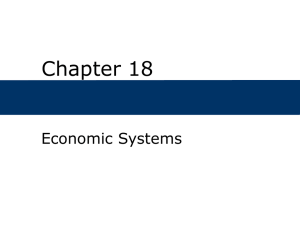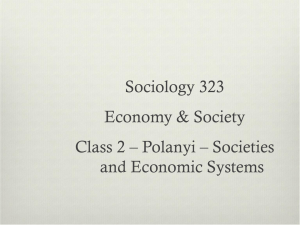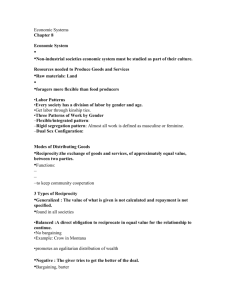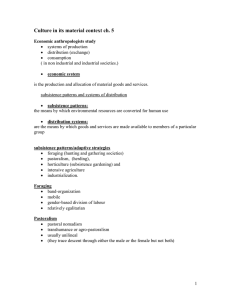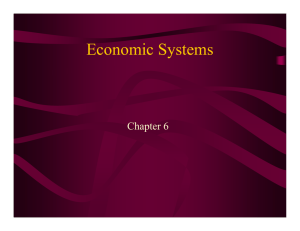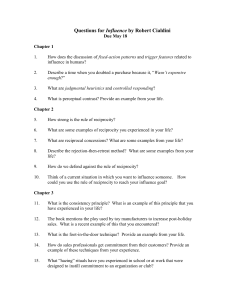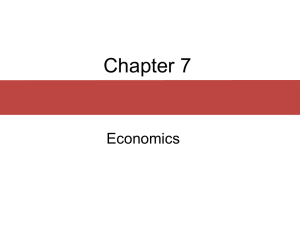Good morning. About the exam WebCT is fixed.
advertisement
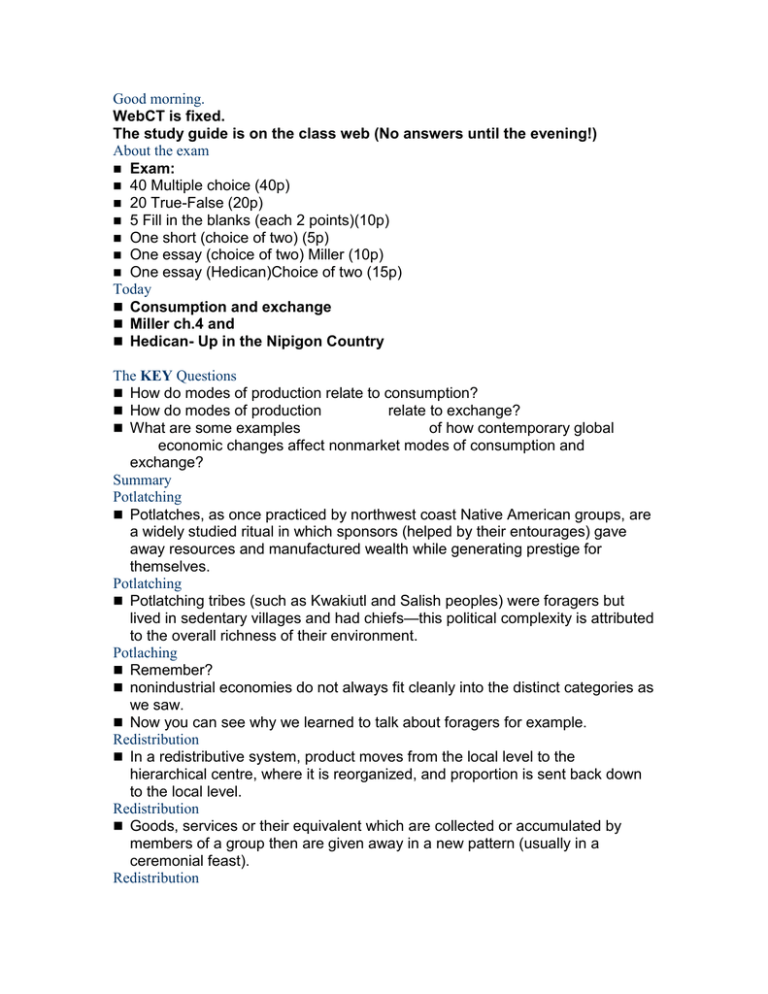
Good morning. WebCT is fixed. The study guide is on the class web (No answers until the evening!) About the exam Exam: 40 Multiple choice (40p) 20 True-False (20p) 5 Fill in the blanks (each 2 points)(10p) One short (choice of two) (5p) One essay (choice of two) Miller (10p) One essay (Hedican)Choice of two (15p) Today Consumption and exchange Miller ch.4 and Hedican- Up in the Nipigon Country The KEY Questions How do modes of production relate to consumption? How do modes of production relate to exchange? What are some examples of how contemporary global economic changes affect nonmarket modes of consumption and exchange? Summary Potlatching Potlatches, as once practiced by northwest coast Native American groups, are a widely studied ritual in which sponsors (helped by their entourages) gave away resources and manufactured wealth while generating prestige for themselves. Potlatching Potlatching tribes (such as Kwakiutl and Salish peoples) were foragers but lived in sedentary villages and had chiefs—this political complexity is attributed to the overall richness of their environment. Potlaching Remember? nonindustrial economies do not always fit cleanly into the distinct categories as we saw. Now you can see why we learned to talk about foragers for example. Redistribution In a redistributive system, product moves from the local level to the hierarchical centre, where it is reorganized, and proportion is sent back down to the local level. Redistribution Goods, services or their equivalent which are collected or accumulated by members of a group then are given away in a new pattern (usually in a ceremonial feast). Redistribution Center Local level Centre Local level Homo-economicus? Classical economic theory assumed that individuals universally acted "rationally" by economizing to maximize profits, but comparative data shows that people frequently respond to other motivations than profit (i.e. maximazing prestige) Maximizing status, sharing, caring, starving to death for ones beliefs. Consumption Intake Output in terms of spending Measurement of consumption as comparative tools Cash, time, labour, goods (cross cultural variations). Cash Cash: A medium of exchange that has an assigned value independent of its intrinsic value (nickels, paper not necessarily golden coins). The process of consumption and exchange Market vs. non-market Consumerism Consumerism: What we do when we go to Chapters to look at the books and buy a funky purple plastic address book (see Miller pg.xx, right column). 120 % of worlds resources who eats the biggest piece of the cake? Past fifty years' consumption = previous consumption of all homo-sapiens Consumption fund a category of budget to meet needs. Alternative ends? People devote their time, resources, and energy to five broad categories of ends: subsistence, replacement, social, ceremonial, and rent. (Miller makes the distinction entertainment fund) Funds Subsistence fund Replacement fund Social fund Ceremonial fund Rent fund Subsistence fund Subsistence fund: work is done to replace calories lost through life activities. E.g. ? Replacement fund Replacement fund: work is expended maintaining the technology necessary for life (broadly defined). Social fund Social fund: work is expended to establish and maintain social ties. E.g. ? Ceremonial fund Ceremonial fund: work is expended to fulfil ritual obligations. E.g. ? $$$$ Thanksgiving meal. Rent fund Rent fund: work is expended to satisfy the obligations owed (or inflicted by) political or economic superiors. (Klein-me) Entitlement Bundles Entitlement at 3 Levels Global – The global economy means some countries are more secure than others – Famine National Household Consumption categories Class Gender Race Age Budgeting Household expenditures (and who they are spent on) depend on the decision maker – Male budgetary control – Female budgetary control – Pooling system – Non-pooling system Food taboos Cultural materialists believe that culture is based on the need to convert energy to human use cultural practices are based on making the maximum use of energy resources India’s sacred cow Protection of cows (Marvin Harris) Cows are worth more alive than dead because they provide a myriad of economic benefits Hindus do not kill cows because they get more energy from the living cow's labor, milk and dung than a dead cow would provide in meat protein. Food taboos Value of food as a way of communicating meaning "Matter out of place" Marry Douglas Cloven hoofs versus those that chew cud Exchanges Material goods Symbolic goods Labour Money People Modes of exchange Balanced exchange Redistribution Market exchange Unbalanced exchange Distribution and exchange The market principle The market principle applies when exchange rates and organization are governed by an arbitrary money standard. Price is set by the law of supply and demand. The market principle is common to industrial societies. Redistribution Redistribution is the typical mode of exchange in chiefdoms and in some nonindustrial states. Redistribution In a redistributive system, product moves from the local level to the hierarchical centre, where it is reorganized, and a proportion is sent back down to the local level. Reciprocity Reciprocity is exchange between social equals and occurs in three degrees: generalized, balanced, and negative. Generalized reciprocity Generalized reciprocity is most common to closely related exchange partners and involves giving with no specific expectation of exchange, but with a reliance upon similar opportunities being available to the giver (prevalent among foragers). Balanced reciprocity Balanced reciprocity involves more distantly related partners and involves giving with the expectation of equivalent (but not necessarily immediate) exchange (common in tribal societies, and has serious ramifications for the relationship of trading partners). Negative reciprocity involves very distant trading partners and is characterized by each partner attempting to maximize profit and an expectation of immediate exchange (e.g., market economies, silent barter between Mbuti foragers and horticulturalist neighbours). Coexistence of Exchange Principals Most economies are not exclusively characterized by a single mode of reciprocity. Changes in Consumption and Exchange Lure of Western goods Cash cropping and declining nutrition Effects of privatization Credit cards Edward J. Hedican Up in the Nipigon Country Anthropology as a Personal Experience Hedican What is the purpose of the book? What is the purpose of reading this book in this class? What is the main point which differentiates it from other examples of knowledge production? “how experience shapes eventual interpretation and textual presentation” (p.18). “I” versus royal “we” in knowledge transmission.
